Unlike traditional sports, there are no home and away fixtures in Counter-Strike. Our open calendar is spread across the globe, making it luck of the drawer whether the crowd will be on any given team’s side. At the IEM Rio Major, that honour will go to the Brazilians in FURIA, Imperial, 00NATION, and Lucas “nqz” Soares of 9z.
And, there are reasons to believe it will be more of an edge than usual: There will be fans at every single match in the Major, from the Challengers Stage all the way to the Grand Final in the Jeunesse Arena. Chances are, those fans will be cheering on their countrymen, which begs the question: How much of an advantage comes from playing on home soil?
Will Imperial get a home crowd buff?
There are a number of challenges to trying to quantify something as intangible as the impact of an event’s location. Attendance at esports events is not publicly recorded, making it hard to identify the difference between a full LANXESS Arena and a studio audience at ELEAGUE over a large dataset. You also do not need to play on home soil to have a de facto ‘home crowd’; Cloud9‘s win at IEM Dallas is not a traditional case of home advantage, but they were cheered at every stage regardless.
To evaluate the performance of a team in front of a home crowd, we first need a benchmark — where a team would place in a vacuum, with no home advantage. The benchmark we have chosen here is to compare a team’s final placement against their placement by the HLTV ranking at the start of the event, meaning we are only considering events since it was implemented at the back end of 2015.
So, if the #6 team in the world ranking was the 4th highest ranked team at the event and finished 2nd, they would be over-performing by 2 places. Then, to account for how many teams at the event, we convert their placement (3rd out of 8 teams, 13th out of 16, etc.) to the equivalent placement in a 16 team tournament. Our ‘home crowd advantage’ is then the difference between a team’s expected placement (using the world ranking) and their actual tournament placement. Over a large sample size of more than five years of action, this starts us off in demystifying the weight of home crowd advantage.
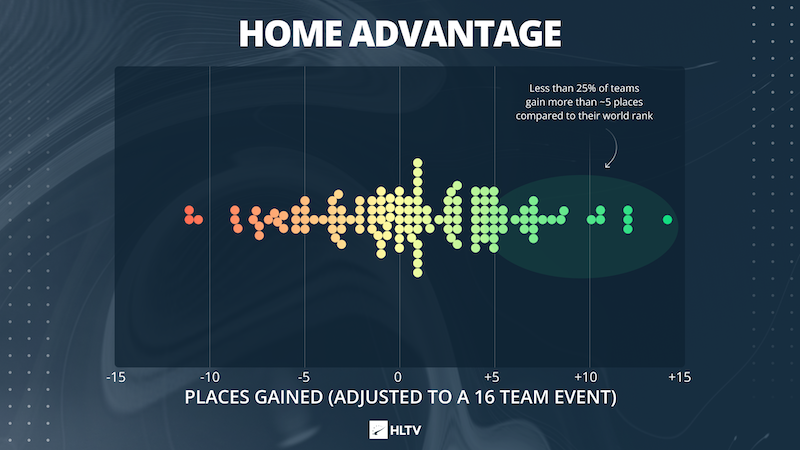
In this swarm plot, we are plotting every home team’s performance — defined as a team with a core of players from the same nation as where the event was held — at a reasonably sized LAN since 2015. We can see that home teams perform, on average, slightly better in their country of origin. The average, a difference of 0.08 percentile ranks, comes to about 1.26 places higher in a 16-team tournament than if we just ordered the attending teams by their world ranking.
If we take this as gospel — and there are many reasons we should not do so — and add two or three places to our home teams at Rio, a 24-team event, FURIA are looking at a jump from 8th seed to the line between playoffs and top four. Imperial will sneak into the top 16, while 00NATION might still struggle to follow them there.
But, the average figure of home advantage resulting in a jump of 2 or 3 places is just that: an average. IEM Rio amplifies all the reasons home advantage exists, with a crowd in all three stages. Few teams, even on home soil, experience the adulation Imperial will receive in Rio.
The only true home run since the pandemic has been Astralis at BLAST Fall Finals 2021, placing five spots higher than their world ranking in 3rd place at their first event with Benjamin “blameF” Bremer and Kristian “k0nfig” Wienecke. Like Imperial can expect in Rio, there was no doubt that the vast majority of the crowd was favouring Astralis there. There is also the fact that this is Brazil’s first Major; a fanbase known for their passion are expected to blow the roof off the Riocentro and Jeunesse Arena.
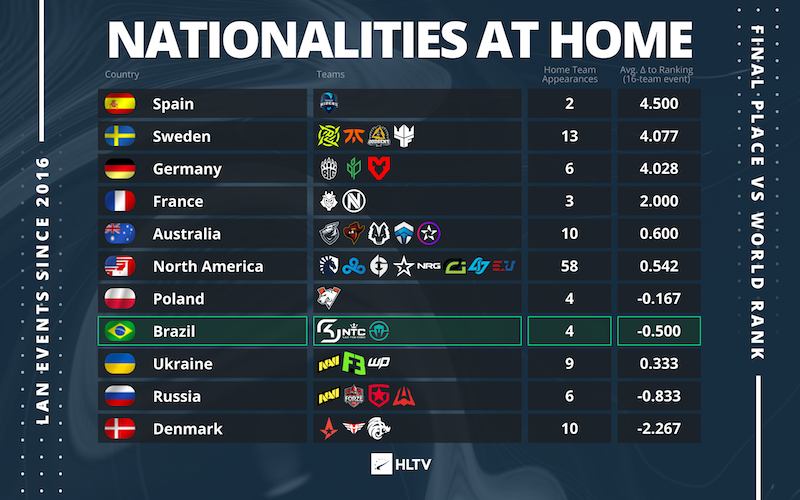
In the two events that have been held in Brazil in the past, however, the home crowd have not seen their favourites crowned. At ESL One Belo Horizonte, SK were in decline and finished 3rd-4th, exactly where the world ranking predicted. At ESL Pro League Season 4 Finals in Sao Paolo, SK were off the back of their back-to-back Major success and the second-highest ranked team at the event and finished just there, losing to Jake “Stewie2K” Yip‘s Cloud9 in the final.
Denmark, too, performs lower than an eye test would imply in terms of offering home advantage, their teams finishing 2.5 ranks lower at home than their world ranking suggests. One reason could be that, with all of the crowd’s devotion to Astralis, North and Heroic were left behind, to play on home soil with no home advantage. To solve that, let’s do the same analysis but with notable organisations (those that have had more than 2 events at home and SK) rather than nations.
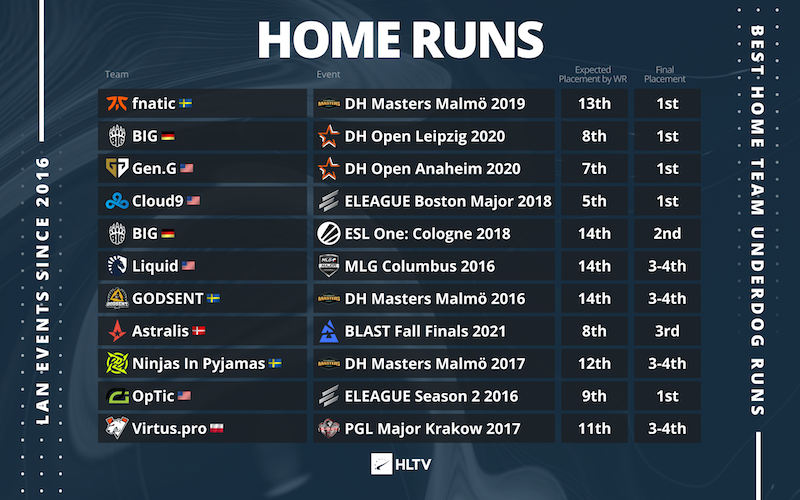
This is a good time to address a flaw of using HLTV world ranking for this. Namely, that higher-ranked teams do not have the opportunity to reflect their home advantage; Astralis was #1 for the majority of their home events in Odense, so anything below a win would be treated as, in our analysis so far, a failure. Yet, in reality, the home crowd might have pushed a number one team like Astralis over the finishing line in a tight series.
On the other hand, a team like BIG, who usually occupy the bottom half of the top twenty, there is an opportunity at every IEM Cologne to have their home advantage recognised. In Rio, that fact could play into Imperial‘s hands. In the past, where anything less than a championship victory was a failure, the crowd might have actually added pressure to the SK side. Now, expectations are lower, Imperial are more experienced, and crucially — their opponents have not had the chance to gain that experience.
When a more inexperienced team, like OG or GamerLegion, face a Brazilian team they will experience an atmosphere incomparable to anything they have played before. This, surely, will only exacerbate the home advantage that is already present.
And yet, this is all speculation. When we divide our decent sample size into specific teams and countries, we are reducing the accuracy of any conclusions that smaller dataset might lead us to. Since 2016, we can see that, on average, home advantage is a real thing — but only for one or two places in a 16-team event, which is fairly insignificant. In reality, teams still, normally, place where they should.
Most of the narrative around home advantage is a case of rosy retrospection, where our brains remember the outliers, the magical home runs of Cloud9 in Boston, fnatic at Malmö or BIG at Cologne.
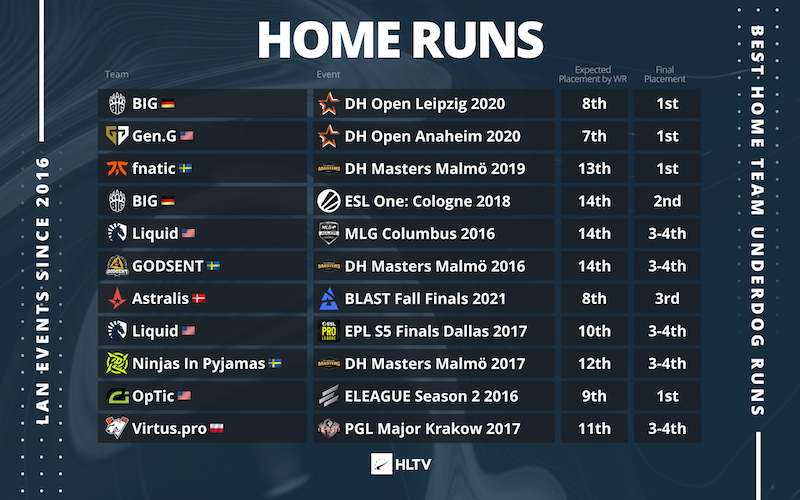
But we are wont to forget that there are nearly as many disappointments on home soil as there are successes, events where the home team does not even get to see the crowd and bombs out in groups. Take OpTic‘s collapse at Atlanta in 2017, where the then-ranked 2nd-best team in the world bombed out in groups.
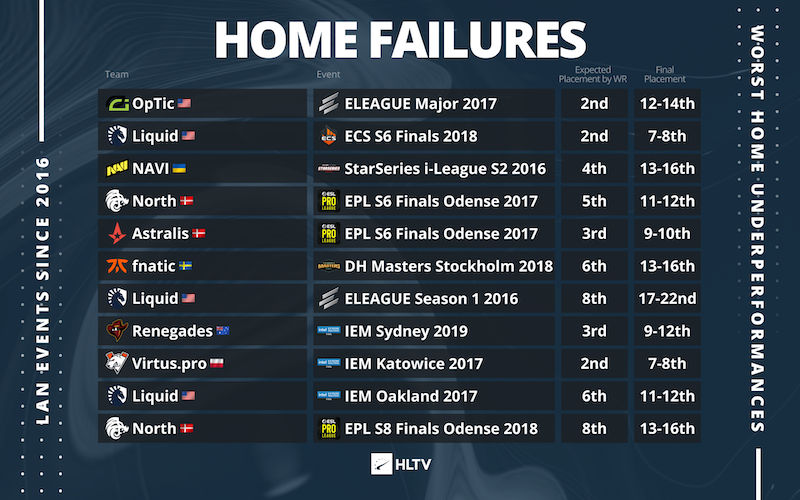
Even with disappointments, our brains often fool us. We remember extremes, both the highs and the lows. The vast, vast, majority of the time, a team finishes an event about where they should. It is far more likely that, even with a home crowd, Imperial finish the Major about where their world ranking and previous form dictates. The same is true of a young 00NATION, and a FURIA side that has seemingly reached a ceiling of a playoff team rather than a championship one.
Yet, it is easy to want to tear down what history tells us usually happens. FURIA‘s situation is not unlike Cloud9‘s before Boston, a home team that may not have looked like champions beforehand but could gather momentum at the right time and in the right place.
Imperial, meanwhile, have shocked us before.
Intangibles that are only mild for other teams seem to explode for them; teams like Cloud9 in Antwerp and Complexity at the RMR were in better form, and by most metrics, were better teams than Imperial when they faced them in elimination matches. But, somehow, Imperial prevailed.
There is a unique pressure on the teams that face the wily Imperial, even without a crowd — that nagging feeling that it was inevitable they would make it to Rio. Counter-Strike is a mental game as much as it is technical, after all. What has happened in the past, with home teams only gaining a small advantage on average, will be little reassurance to inexperienced teams facing Imperial in such a high-pressure environment.
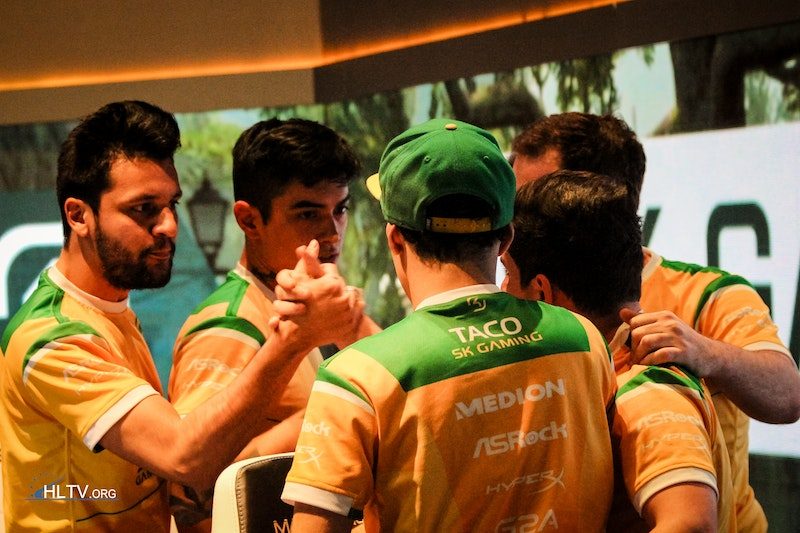
The old SK squad could not turn home advantage into a trophy in their two attempts on Brazilian soil
But, the thing with cold, hard, statistics is that they are not prone to narratives like this. A team may crumble against Imperial in the face of a hostile crowd, but can they force that response in three separate series? Imperial lost to Copenhagen Flames in Antwerp, a match that was far easier than Cloud9 on paper. It is not like Complexity were heavy favourites in their decider at the RMR. Only a few teams, in all of CS:GO, have ridden their home advantage to success, stringing together upset after upset.
The truth is that home advantage acts differently in different environments. For some teams, it’s an added pressure they could do without. For most, it doesn’t seem to make too much of a difference. But for a lucky few, it provides the motivation that they could not find otherwise. Cloud9‘s Boston success, despite being #5 in the world beforehand which excludes them from some of the tables in this article, will always be the shining example of that.
Gabriel “FalleN” Toledo, Fernando “fer” Alvarenga, Marcelo “coldzera” David, and to a lesser extent Epitacio “TACO” de Melo, are in the twilight of their careers, perfect examples of players that could wield a home tournament to find similar levels of motivation to their prime for a one-off tournament. They have made it to Rio, a home Major they have waited for ever since its postponement in 2020.
It is the scene of one of their last dances, with FalleN planning his retirement for the end of 2023. Every ounce of their energy will go into making this home Major a success. Home advantage, in history, has not been a magic wand. But, we have not had an event like IEM Rio before. Magic may exist after all.
- alpha metaverse
- battlebots
- blockchain
- blockchain conference esports
- coingenius
- crypto conference esports
- esport games
- esporta
- esporta app
- esporta fitness
- esports
- evil geniuses
- games with esports
- globo esporte
- HLTV
- loco esports games
- metaverse esport games
- national sports week
- plato
- plato ai
- Plato Data Intelligence
- Plato Game
- PlatoData
- platogaming
- simplicity esports
- spasm esports games
- steam esports games
- team solomid
- top esports games
- tundra esports
- twitch esports games
- zephyrnet













![[LIVE] First European qualifier for IEM Rio begins shortly [LIVE] First European qualifier for IEM Rio begins shortly PlatoBlockchain Data Intelligence. Vertical Search. Ai.](http://platoblockchain.com/wp-content/uploads/2022/08/qr2xrl-97vlBGQiUxLgoCl-300x200.jpg)